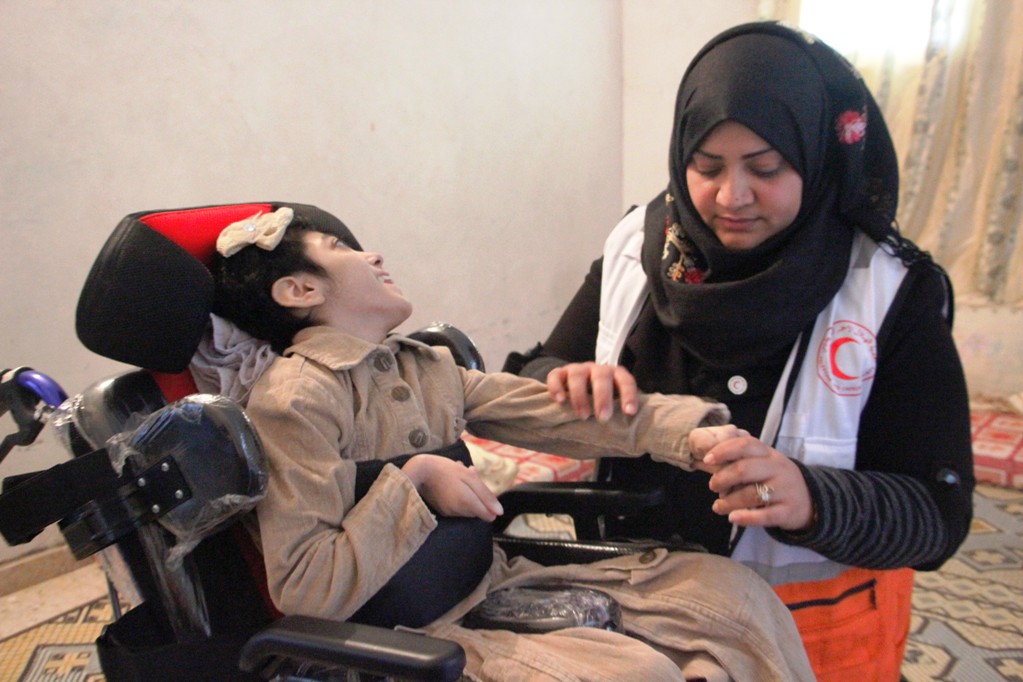
By: Raed El Nims
Families of children with cerebral palsy in the Gaza Strip often feel helpless at being unable to provide the appropriate care to their children given the lack of specialized institutions dealing with this condition in the area. This void is being partially filled by PRCS' Rehabilitation Department, whose Home Enrichment Program assists families of children with cerebral palsy (CP), teaching them to build the capacities of their children and to provide them with the appropriate nutrition, hygiene and social skills.
"A field survey of each governorate helps us determine which children are in need of our intervention. We work with their families and train them on caring for their children and covering their needs to ensure their physical and psychological health", Amany Al Jamal, a rehabilitation specialist working at PRCS/Rafah, said.
Islam Abou Fakhr (11) has CP. Her mother did not know how to feed her, bathe her or maintain her personal hygiene and was unable to cope with her screams, which adversely affected Islam's health and caused her bed sores. The Home Enrichment Team visited Islam at her home two months ago to determine her needs. An evaluation meeting held by the Team in Rafah led to the preparation of a treatment plan for the child and a training plan for her mother under guidance from the Team's physiotherapists, occupational therapists and psychologists.
Islam's mother, Um el Abed Abou Fakher (41), describes her experience with the Home Enrichment Team as follows: "When the PRCS' specialists started visiting us, they taught me how to feed my daughter correctly and how to bathe her quickly. The child is now very responsive, and PRCS has provided us with a wheelchair that is appropriate for her condition. In the past, my daughter used to stay in bed all the time. Now, she can recognize us and tells us if she's hungry or sleepy using special signs that we learned from the PRCS' specialists. A smile has finally appeared on my daughter's face instead of all that screaming that used to make us feel so helpless and hopeless in the past. She can also recognise the Team specialist who visits us and seems happy to see her every time".
Khaled Al Hamaydeh (6) was diagnosed with Down syndrome and heart defects. Khaled used to constitute a major problem for his father, Abdallah Al Hamaydeh (26), as the child could neither walk nor move around. It was impossible for his parents to know what he wanted or needed as he did not speak, would not communicate with his parents or siblings, screamed constantly, shied away from strangers and used to hit his head against the wall.
"A PRCS' survey led us to meet Khaled and learn more about his unique condition. We devised a plan to assist him, help his family, end his isolation and integrate him with his siblings and peers in the neighbourhood. We used a learning through play approach. Five sessions later, Khaled started responding to this approach and gradually started playing with his siblings. He can now ask for food, drink and to be taken to the bathroom", Yasser Soboh, rehabilitation specialist, said. As for the child's father, Abdallah, he said: "I cannot tell you how happy I was when I saw Khaled come to us with an empty glass of water - his way of telling us he was thirsty. In the past, he used to bang his head against the wall without us understanding what it is he wanted".
Khaled now wanders around the house and even ventures outside where he smiles to passers-by. He no longer resists his mother when she takes him with her outside the house and can express his needs and feelings calmly after two months of rehabilitation and psychological therapy by the PRCS' Home Enrichment Team.
Speaking about the Team's approach, social worker Iyyad Sabe' el Eysh said: "Following a needs' assessment, PRCS implements a plan based on integrating these children in society. At the same time, it helps parents build the capacities of their children and brings them closer together to enable parents to cover their children's needs.
The Team assisted 50 families in the past 6 months, achieving great success in terms of integrating children with CP and engaging families in various programs implemented by PRCS, mainly recreational trips, learning through play activities and the train-the-parents program which was acclaimed by these children's families ".